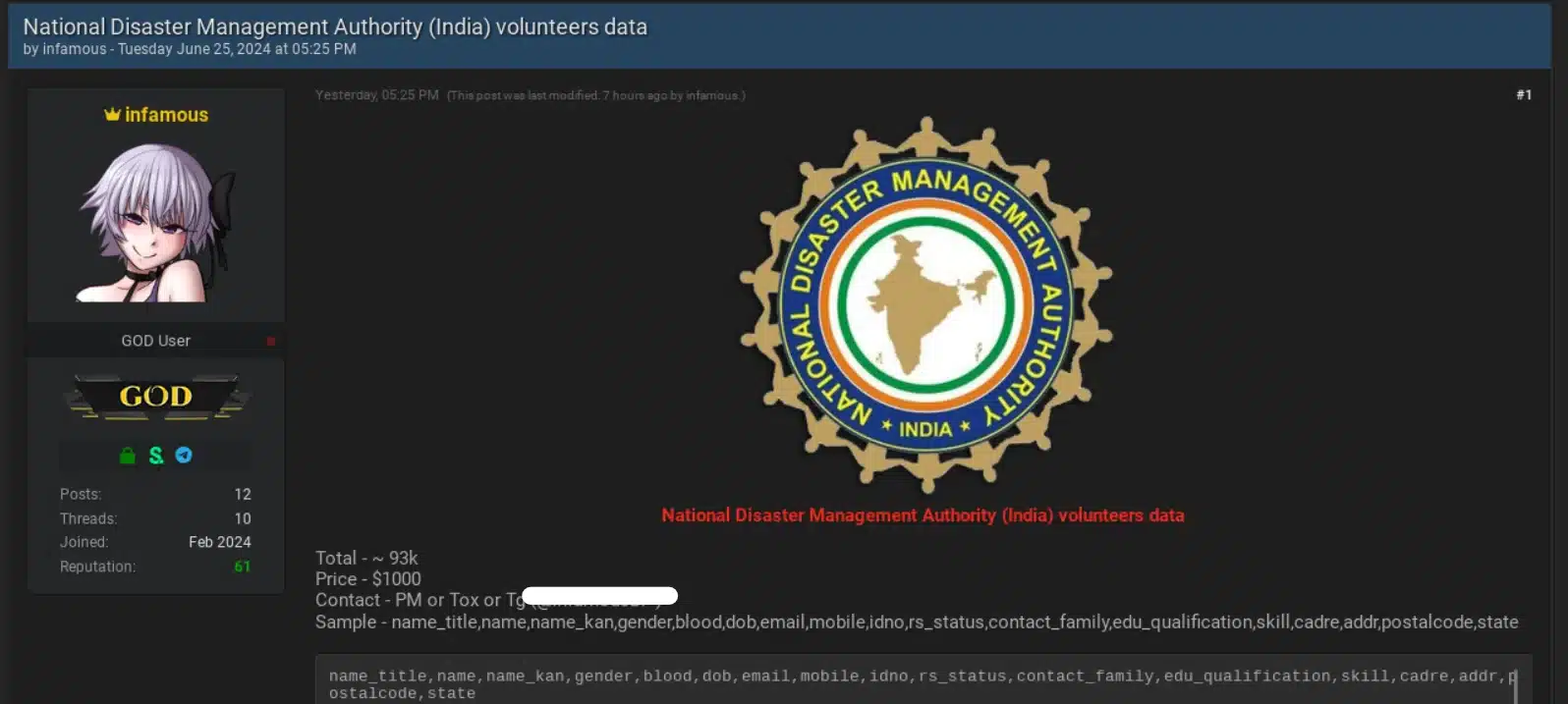Volunteered For NDMA? Your Personal Data Is Allegedly Leaked

Threat actor claims to be selling the personal data, including names and phone numbers of volunteers, on the dark web for $1,000.
Krishna Murthy June 27, 2024

Source; National Disaster Management Authority
Share on LinkedInShare on Twitter
A threat actor claims to have carried out a cyberattack on India’s National Disaster Management Authority (NDMA). The NDMA is the top statutory body for disaster management in India, with the Prime Minister as its chairperson. The threat actor, operating under the alias “infamous,” has allegedly gained access to personal data of 93,000 volunteers, including their names, age, mobile numbers and other critical records. The hacker is currently selling the data on the dark web for $1,000.
Exploring Data Leak Claims of NDMA Volunteers
The NDMA was created in 2006. Its primary responsibility is to coordinate response to natural or man-made disasters and for capacity-building in disaster resiliency and crisis response. It is also the apex body for setting policies, plans and guidelines for disaster management to ensure a timely and effective response to disasters.
The allegation that NDMA data had been hacked emerged on June 25 on the data leak site BreachForums. The threat actor “infamous” claimed to be in possession of a stolen database, consisting of the Personally Identifiable Information (PII) of NDMA volunteers, including their personal details such as name, title, gender, blood group, date of birth, email, mobile number, ID number, marital status, family contact number, education qualifications, skills, cadre, address, postal code, and the current state of residence.

Source: X
To substantiate the data breach claim, the threat actor attached sample records, with the latest timestamp of June 2024, while disclosing that the database includes records of 93,000 volunteers. The cyberattacker is asking $1,000 for the entire data set on BreachForums.
Despite these claims by the threat actor, a closer inspection reveals that NDMA’s website is currently functioning normally, showing no signs of a security breach. The threat actor has also not provided clarity on the time period when the services of volunteers occurred.
The Cyber Express has reached out to NDMA to verify the alleged cyberattack. As of now, no official statements or responses have been received, leaving the claims unverified.
NDMA Volunteers Must Stay Vigilant
While authorities investigate the data breach claim, NDMA volunteers must be vigilant and take steps to prevent any malicious activities. Cybercriminals usually employ a range of tactics to misuse personal information, perpetuating identity theft and financial fraud. Some prominent techniques include phishing, where hackers trick individuals into revealing their PII by mimicking legitimate entities through fraudulent emails or phone calls.
Individuals are also susceptible to identity theft and fraud, where fraudsters use psychological tactics to divulge sensitive information, such as passwords or credit card details. Since the email addresses have also been allegedly leaked, individuals must be vigilant of suspicious messages requesting sensitive information, as well as any unusual activity involving new or existing accounts.
Hackers Target 373 Indian Govt Websites in Five Years: Report
According to data published by the Indian Government, hackers have repeatedly targeted key websites run by the administration. An article in The Hindustan Times, quoting data from the Ministry of Electronics and Information Technology, said that, “As per the information reported to and tracked by CERT-In (Indian Computer Emergency Response Team), a total number of 110, 54, 59, 42, 50 and 58 website hacking incidents of Central Ministries/Departments and State Government organizations were observed during the years 2018, 2019, 2020, 2021, 2022 and 2023 (up to September).”
The report added that some government offices were still using outdated Windows versions in their official computers and laptops, making them vulnerable to cyber threats.





